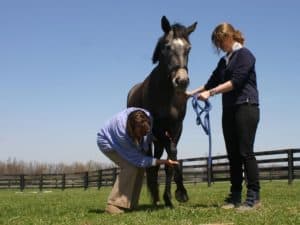Equitarianism Brings Veterinary and Farrier Care to Dominican Republic Equids
Through literally hundreds of vaccinations and dewormings, 60 surgeries, nutrition training, and a nationwide farrier clinic, all from June 6-13, the Dominican Republic’s horses, donkeys, and mules are once again benefiting from a new concept known as “equitarianism.”
The equitarian effort, headed by Jay Merriam, DVM, MS, of the Massachusetts Equine Clinic in conjunc
- Topics: Article
Through literally hundreds of vaccinations and dewormings, 60 surgeries, nutrition training, and a nationwide farrier clinic, all from June 6-13, the Dominican Republic's horses, donkeys, and mules are once again benefiting from a new concept known as "equitarianism."
The equitarian effort, headed by Jay Merriam, DVM, MS, of the Massachusetts Equine Clinic in conjunction with the Massachusetts Veterinary Medical Association, targets the second poorest country in the Western Hemisphere and is part of the association's "Samana Project." Since 1993 veterinarians, technicians, and other volunteers have been traveling to the Dominican Republic twice a year to provide much-needed health care to the country's working equids, as well as small animals.
The Samana Project summer 2010 team just completed "the most productive year ever," according to equine podiatrist and Samana team member Steve O'Grady, BVSc, MRCVS, of Northern Virginia Equine in Marshall. "“The horses were just coming out of the woodworks, nonstop," he said. Vaccines and dewormers were given until the team’s stock, donated by U.S. manufacturers, was depleted. A team of three veterinarians and and numerous veterinary students performed 52 castrations in addition to other necessary surgeries in four days.
Castration not only promotes better working equids but also prevents uncontrolled breeding and reduces major health risks including injuries sustained from fighting stallions, O'Grady said. However, castration is not easily accepted in Hispanic culture, where stallion ownership represents a long-standing, proud tradition. Through education efforts over the years, the Samana team has been able to promote not only the benefits of gelding but also the increased breeding of mules, which are sturdier for work than the horses and are sterile with regards to breeding
Create a free account with TheHorse.com to view this content.
TheHorse.com is home to thousands of free articles about horse health care. In order to access some of our exclusive free content, you must be signed into TheHorse.com.
Start your free account today!
Already have an account?
and continue reading.

Written by:
Christa Lesté-Lasserre, MA
Related Articles
Stay on top of the most recent Horse Health news with












